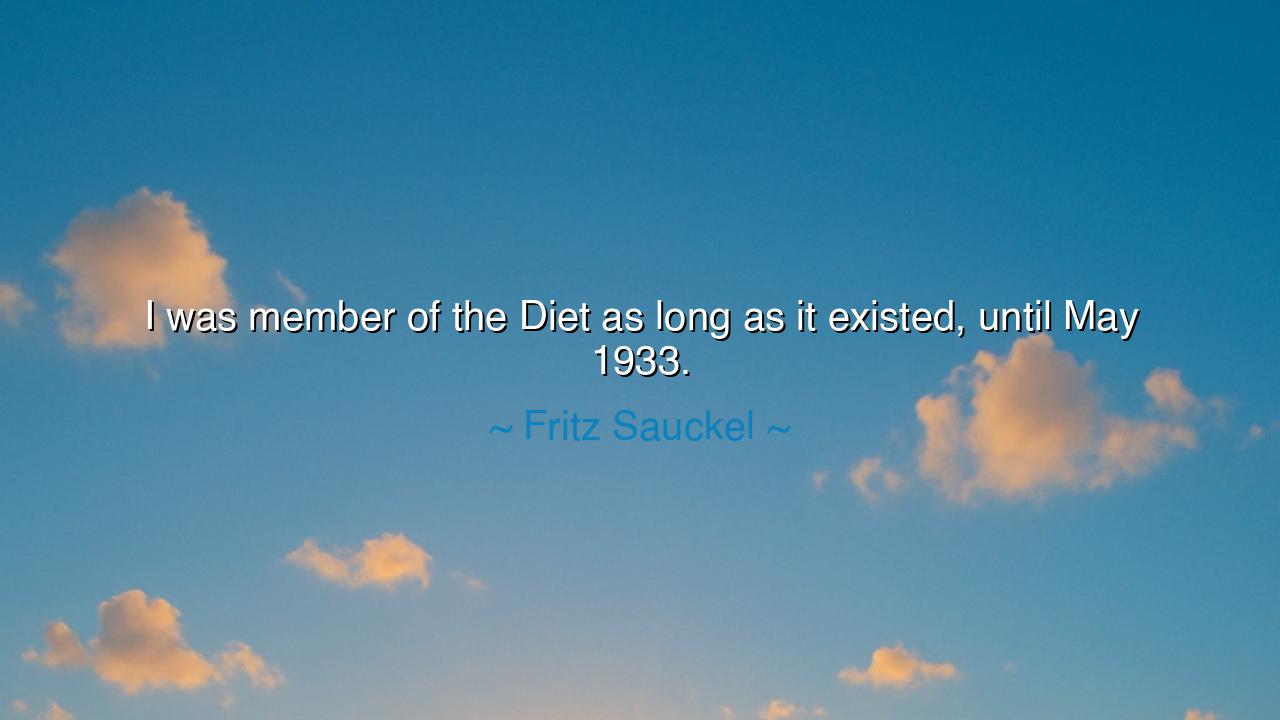
I was member of the Diet as long as it existed, until May 1933.






"I was a member of the Diet as long as it existed, until May 1933." These words, spoken by Fritz Sauckel, stand as a lament and a declaration, echoing through time as a solemn reminder of the fragility of institutions and the inevitable tide of history. Sauckel's statement speaks not only of his personal experience but of the larger unfolding of events that shaped the world in the early 20th century. To understand the weight of these words, we must first seek the meaning behind them and the powerful forces that gave rise to them.
The Diet, an assembly that once served as the legislative body of Germany, was a place of debate and discourse, where decisions were made that would determine the course of a nation. In those days, it was a symbol of democracy and political power, a beacon of hope for the future of the German people. It was here that men like Sauckel, once a member of this assembly, played their part in the delicate dance of politics. But, as with all things of the mortal realm, the Diet did not endure. In May of 1933, it was dissolved, its power extinguished by forces greater than any individual, swept away by the dark storm of Nazi ambition.
What is the lesson to be learned from this? How can the fall of an institution like the Diet inspire us today? We are reminded that, in the grand sweep of history, nothing is permanent. Political systems rise and fall, empires decay, and even the most steadfast assemblies are vulnerable to the winds of change. The disbanding of the Diet marks not just the end of a body of governance, but the shifting of power—the moment when a nation’s future was seized by an ideology that would change the world forever. It is a tragic reminder that power is not given, but taken; it is a reflection of the hunger within the human heart for control and dominion.
Take, for instance, the fate of Czarist Russia in the early 20th century. The Russian Revolution of 1917, like the rise of the Nazis in Germany, dismantled an entire imperial order, tearing apart centuries of tradition and replacing it with a radically different system. The once-great Russian monarchy, like the Diet, was powerless in the face of the tidal wave of change. Leaders, like Fritz Sauckel, often find themselves caught in the currents of history, unable to change the course of a ship already destined for destruction.
But in this, there is wisdom. There is, if you will, a heroic lesson to be drawn. For just as the fall of the Diet was inevitable in the face of rising totalitarianism, so too is the rise of power—often marked by its promises of strength and unity—also doomed to reveal the fragility of its foundation. In the grand cycle of time, we are reminded that no institution or individual can stand untouched by the forces of fate. Those who forget the lessons of history are destined to witness the same tragedies unfold again.
So, what must we do with this knowledge? The answer lies in vigilance and wisdom. We must not forget that institutions, no matter how noble or long-standing, can be overturned. We must learn the lessons of those who came before us, those who witnessed the rise and fall of powers beyond their control. Fritz Sauckel’s statement serves as a call to us, to cherish the freedom we have and to protect the systems of governance that allow our voices to be heard. If we wish to avoid the tragedies of the past, we must never become complacent or forget the fragility of democracy.
In the shadow of May 1933, we are called to stand firm. The lesson here is clear: the price of peace and freedom is eternal vigilance. We must never allow our hearts to be swayed by the temptations of easy power or the siren call of those who would seek to dominate. Instead, we must find our strength in unity, in the bonds of community, and in our unwavering commitment to the principles of justice. And let us remember, as Sauckel did, that it is not the institutions themselves that matter most, but the human spirit that resides within them. The fall of the Diet is but a chapter in the greater story of humanity. And it is within our power to write the next one.






AAdministratorAdministrator
Welcome, honored guests. Please leave a comment, we will respond soon